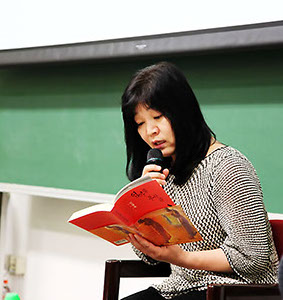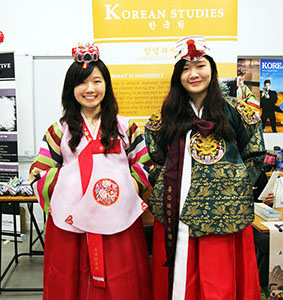K-Popular!
Korean pop music and dramas are a huge hit in Hong Kong. They are also driving strong demand for HKU’s Korean Studies programme.
Hong Kong’s seemingly insatiable demand for all things Korean is having some positive knock-on effects for HKU’s Korean Studies programme. The classes are so popular that supply cannot keep up with demand.
In 2012 Dr Su Yun Kim arrived to head up the programme and expand its focus from just language to combined language and area studies. Demand was strong and rising so she got approval to double staff and student numbers, to six staff and about 600 students today. But that has still not been enough. Nearly one of every two course applicants is turned away. Further growth in both staff and student numbers is therefore planned.
“This boom in popularity is probably a combination of two things,” she said. “First, we offer the only Korean Studies programme in Hong Kong, which I was quite shocked to discover when I came here because of all the connections between Hong Kong and Korea. And second, the popularity of Korean culture has attracted more students.
“Students come into our classes thinking Korean pop music (K-pop) is cool, and they know all these little phrases from Korean dramas. What we’re doing in this programme is turning that interest around and saying, look at the Korean family dynamic. There may be some similarities with Hong Kong’s, but the gender issues are different. This leads to discussions about things like family relationships, the history of Korean patriarchy and Confucian tradition. We can still focus on K-pop – one student did a capstone research paper on it – but it has to be done from an academic perspective.”

![]() Learning about a foreign country, whether it’s Korea or Japan or France, makes you think about your own society. It gives youa better understanding of who you are and where you’ve come from.
Learning about a foreign country, whether it’s Korea or Japan or France, makes you think about your own society. It gives youa better understanding of who you are and where you’ve come from. ![]()
Dr Su Yun Kim
A window and a mirror
Ms Chen Ting, a first-year Arts student, was one of those whose interest sprang from Korean pop music and television dramas. On arriving at HKU, she decided out of curiosity to take a course in Korean language. Now she wants to major in Korean Studies. “I want to study the history and culture and know more deeply about Korea. I have started to think of having a career related to Korea after I graduate,” she said.
For Ms Vivian Chui Wai-lam, also a first-year Arts student, Korean Studies was a major reason why she decided to study at HKU. Her interest began with K-pop six years ago and has led to a fascination with everything about the country. “This course is deepening our knowledge about Korean culture, society, history and customs and helping us to recognise the differences between Korean culture and our own,” she said.
This is one of the goals of the programme – to provide both a window into another world and a mirror to reflect on. Dr Kim experienced something similar herself when she studied French in her native Korea. That led her to become more interested in French literature and culture, and to discover to her surprise that France was an imperialist country – something that resonates in Korea given its occupation last century by Japan.
“Learning about a foreign country, whether it’s Korea or Japan or France, makes you think about your own society. It gives you a better understanding of who you are and where you’ve come from.
“This semester I have been focussing on social change and social movements. Student consciousness was very important in Korea in the 1970s and 1980s, and there are even elements of it there today. My Hong Kong students have responded to that – they went through the Umbrella Movement last year, so they have a better understanding of these things now.”
Research is a focus, too
Apart from teaching undergraduates, Dr Kim is also advancing knowledge about Korea through a research postgraduate programme and her own scholarly work. She recently was awarded a General Research Fund Early Career Scheme Award to look at romance and family themes in popular Korean fiction in the last century. This genre has been ignored by scholars because it is not ‘high fiction’, but it thrived during Korea’s colonisation when overtly political themes were taboo. Dr Kim wants to trace its influence on modern Korean film and drama.
She is also part of a project with Dr Lin Peiyin of the School of Chinese and co-authors in Japan and the United States to compare the film and literature of Taiwan and Korea. Both countries were colonised by the Japanese and later came under strong American influence. The project recently received funding from the Louis Cha Fund in the Faculty of Arts, and its goal echoes that of her Korean Studies programme: “We want to compare and see what is similar and what is different,”
Dr Kim said.


Award-winning Korean novelist Shin Kyung-sook was invited to a book sharing session held by the Korean Studies programme.
Students promoting the Korean Studies programme on HKU’s Information Day.



